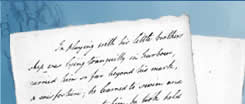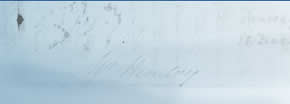| Admiralty |
| The military and administrative control of the Royal Navy. The name applied to the office of the Lord High Admiral whose offices were executed by the Lords Commissioners of the Admiralty. |
|
| Aloe americanae |
| Also known as the century plant, miracle of nature and American agave. Multifunctional - sap is used as a disinfectant; leaves can be made into paper; thorns can be used as pins and needles. |
|
| Aloes |
| Shrubby, succulent plants of the lily family. |
|
| Breadfruit |
| Also known as panapen, breadnut and pana de pepita. The interior pulp is the edible portion. Mostly eaten after cooking. Fruits can weigh 4.5 kg (10 lb) or more each. Introduced to the Caribbean by Bligh - 347 trees arrived on HMS 'Providence' in 1793. Intended as food for the slaves. |
|
| Brennus |
| Leader of a band of Gauls who captured Rome about 390 BC. |
|
| Candelaria |
| The statues Flinders records were in the memory of the last nine kings. They were made of local lava stone. Most have since eroded away. |
|
| Cartel |
| An official ship or fleet of ships used in the official and sanctioned exchange of prisoners of war. |
|
| Dolphin fish |
| Also known as mahi-mahi or dorado. A popular food and sport fish known for its spectacular colouring. |
|
| Dragoons |
| The dragoons referred to here are H.M. 19th Light Dragoons. Formed 1781 for service in India (as the 23rd Regiment of Light Dragoons; renumbered 19th in 1786). For 16 years the only British cavalry unit in India. |
|
| East India Co |
| The Honorable East India Company was formed by Royal Charter in 1600 and had a monopoly on trade in the east. Constantly warring with the Dutch United East India Company over precious trade goods and routes. Monopoly lasted until 1833 but the company remained as civil administrators in India until 1858. Had their own shipyards in England - hence the term East Indiaman - for their large (and armed) cargo ships. Major bases in Surat, Bombay, Bengal and Madras. |
|
| Euphorbia |
| Succulents. 'Euphorbia canariensis' is known as the Canary Islands spurge. Characterised by a milky sap and grows on the dry barren rocky slopes. |
|
| Hedgehog fish |
| Flinders is probably referring to the puffer fish. Over 120 species worldwide. They inflate themselves with air or water when threatened - making it very difficult for a predator to swallow them. Some species can be poisonous if not prepared properly. They feed on corals, sea snails and small shellfish. |
|
| Hottentot |
| Peoples of Southern Africa whose proper name is Khoikhoin. Mostly used as a derogatory term. |
|
| Linnaen Society |
| Carolus Linnaeus (1707-78) was the first to truly frame the principles for defining genera and species and to create a uniform system for naming them. The Linnaean Society in London care for his manuscripts etc. |
|
| Marvel of Peru |
| A sweetly scented small perennial that flowers in the afternoon and is also known as afternoon delight and four o'clock plant. Has clusters of red, pink, white, yellow or striated tubular flowers. |
|
| Nautili |
| Member of the cephalopod class of molluscs. |
|
| Naval Chronicle |
| A journal issued six-monthly from 1799-1818 on all naval matters - articles, letters, despatches. |
|
| Nutmeg and cloves |
| Two of the most important spices of the East Indies spice trade. Found only in the islands until transplanted to other countries. Essential as food flavouring and for medicinal properties. |
|
| Order of St Dominic |
| Commonly known as the Dominican Order. Founded by St Dominic circa 1170-1221 in Spain. |
|
| Parole |
| A signed agreement between a prisoner of war and his captors whereby the prisoner is given certain freedom of movement on the condition that he refrain from attempting to escape or from attempting to contact and/or pass on information to any enemies of his captors. A parole can also be extended to include return to his homeland on the same conditions. Flinders was paroled on Ile de France and stayed with the D'Arifat family; he was then paroled to return to England in 1810. The French Minister for the Navy cancelled his parole in 1812 thereby allowing him to take up arms against the French again if needed. |
|
| Portuguese man of war |
| Jellyfish. Also known as the bluebottle. Tentacles have a stinging capsule to stun and capture prey. |
|
| Post-Captain |
| Equivalent to the Captain of today. |
|
| Privateering |
| Sanctioned by Napoleon and part of his aim to inflict blows to British commerce and to harass the Royal Navy. Admiral Linois's division operated out of Ile de France (Mauritius). |
|
| Royal Society |
| The Royal Society of London for the Promotion of Natural Knowledge. Founded 1660 and still in existence today. |
|
| Semper vivum |
| A drought-tolerant perennial. |
|
| Society of Emulation |
| A Literary Society on the Ile de France. |
|
| Spanish mackerel |
| A good sport and eating fish found schooling both inshore and offshore. |
|
| Spermaceti whale |
| Flinders is probably referring to the sperm whale, a member of the toothed whales. The males can grow up to 18.5 m (60 ft). |
|
| Time keeper |
| Chronometer - an instrument used to establish longitude. John Harrison was acknowledged to have solved the 'longitude problem' with his fourth chronometer, H4, in 1773. Captain Cook successfully used a copy of H4 on his second voyage of discovery, 20 years before Flinders' voyage in the 'Providence'. |
|
| Trifolium |
| Leguminous plants such as clover. |



